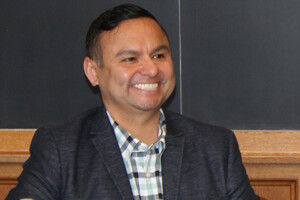Experts Discuss What’s at Stake for LGBTQ+ Health Care

On April 10, the Solomon Center for Health Law and Policy4 hosted “What’s at Stake: The Future of LGBTQ+ Rights, Health, and Health Care.” This expert panel focused on the current landscape of LGBTQ+ legal protections and their implications for health and health care. Solomon Student Fellow Kyle Gavulic, Yale School of Medicine and Graduate School of Arts & Sciences ’29, moderated the discussion.

Gilbert Gonzales (Associate Professor in the Department of Medicine, Health & Society, the Department of Health Policy at Vanderbilt University) began with a number. According to the Centers for Disease Control, approximately 5.5% of U.S. adults identify as LGBTQ+. But this statistic hides generational differences, according to Gonzales, who is also Associate Professor in Vanderbilt’s Program for Public Policy Studies and the Associate Director of the Vanderbilt LGBTQ+ Policy Lab. He noted that more people are coming out today, in part because of policy changes that make it safer to openly identify as LGBTQ+. Closer to 10% of millennials and nearly 20% of Gen Z identify as LGBTQ+, data show.
Despite growing numbers of younger people who are open about their identities, there are still baseline disparities in health and access to care, experts note. A well-supported model called the minority stress theory holds that a primary source of these disparities is stress caused by experiencing discrimination and stigma. Such stress increases the risk of negative physical and mental health outcomes, according to the theory.
Gonzalez highlighted two of the Biden Administration’s efforts to advance LGBTQ+ health equity and justice. First is the Respect for Marriage Act, which officially repealed the Defense of Marriage Act and requires all states to recognize same-sex and interracial marriages. Second is the Executive Order on Advancing Equality for Lesbian, Gay, Bisexual, Transgender, Queer, and Intersex Individuals. This directive led to the release of a report detailing how federal agencies can implement more equitable data collection practices.

Zee Scout, a Bertha Justice Fellow at the Center for Constitutional Rights, then discussed how the health disparities that Gonzalez described play out in practice. Scout shared observations from her work in the U.S. South, noting that some of her friends, colleagues, and clients have been doxxed or relegated to work in illicit economies. Daily instances of discrimination like these have produced many legal issues, Scout said. For one, circuit courts are split in their interpretation of Bostock v. Clayton County, the Supreme Court’s 2020 opinion holding that Title VII of the Civil Rights Act 1964 prohibits an employer from discriminating against an employee on the basis of their sexual orientation or gender identity. The Eleventh Circuit has interpreted Bostock narrowly, holding that discrimination against transgender people does not always qualify as impermissible sex discrimination. Other circuit and district courts have decided otherwise.
Noting that the Supreme Court has not been amenable to Fourteenth Amendment arguments in discrimination cases lately, Scout suggested that First Amendment arguments could be an option — though still a fraught one. She explained that the First Amendment has already been used to challenge antidiscrimination efforts, pointing to 303 Creative LLC v. Elenis. In that case, the Supreme Court held that the First Amendment prohibits a state antidiscrimination law which would require a web designer to design websites for same-sex weddings.

Next, Alexandra (Ali) Curd, a Staff Attorney at Lambda Legal, gave an overview of the current legal landscape for gender-affirming care. Nearly half of U.S. states have banned what medical experts define as best-practice care, though some bans have not yet gone into effect. Curd said that shield laws are a main source of protections in this otherwise bleak landscape. These state laws protect medical providers and patients from civil and criminal cases brought in states that ban abortion and gender-affirming care. Curd stressed the importance safety, not just access to care. People may be able to receive initial care, Curd noted, but then may return home to a state that bans continuing or even emergency care.
Curd also discussed the circuit court split over the scope of Bostock. She noted that the split will likely impact cases challenging enforcement of an anti-discrimination provision of the Affordable Care Act, section 1557. This provision includes discrimination on the basis of pregnancy, sexual orientation, gender identity, or sex characteristics in its definition of sex discrimination.

Jesse Ehrenfeld, President of the American Medical Association, encouraged the audience to be leaders in efforts to safeguard the health of all Americans, especially those in marginalized communities. A country in which care is consolidated in certain areas “is not an America I want to live in,” he said.
Ehrenfeld, who is also Senior Associate Dean and Professor of Anesthesiology at the Medical College of Wisconsin, observed that his colleagues have increasingly had to call the hospital attorney to ask if they are legally allowed to deliver a particular kind of care. This tension between ethical and legal obligation exists on top of the daily pressure of administrative duties that medical professionals face, he said.
Ehrenfeld found some room for optimism, however. Although the Department of Health and Human Services has not brought many section 1557 enforcement actions, a single investigation can lead to other providers changing their policies, he noted. In 2015, the department’s Office of Civil Rights entered into a voluntary agreement with Brooklyn Hospital Center after receiving a complaint that patients were being placed in multiple-occupancy rooms without regard for gender identity.
“What’s at Stake: The Future of LGBTQ+ Rights, Health, and Health Care” was cosponsored by Yale Health Law and Policy Society (YHeLPS), Yale Law Women+ (YLW+), OutLaws, Dean's Advisory Council on LGBTQI+ Affairs, OutPatient, Out in Public, and the Yale School of Nursing.


